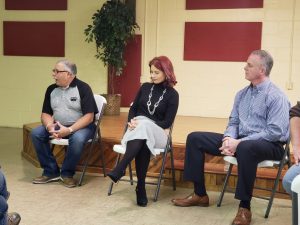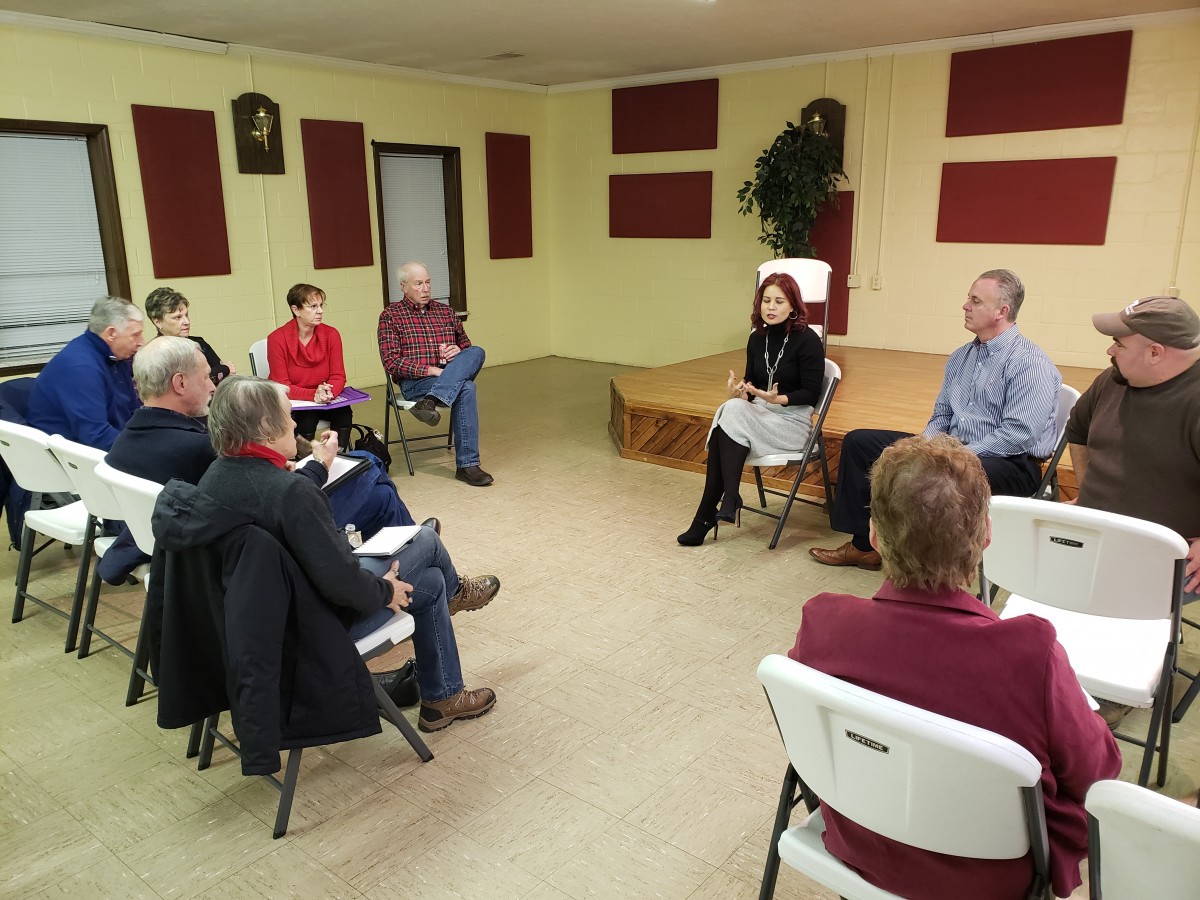RIVESVILLE — Eight natural gas royalty owners turned out for a town hall put on Wednesday evening in Rivesville by the National Association of Royalty Owners (NARO).
Among the things they learned is that the state isn’t doing enough to enforce the laws intended to protect them, and it’s not doing enough to collect the tax dollars owed it by landowners and production companies.

This was the third of four town halls NARO is holding in West Virginia’s Marcellus-Utica area, said chapter President Valerie Antonette. The first, in Sistersville, was as lightly attended as this one. The second, held Tuesday in Moundsville, drew 170. The fourth is set for Dec. 11 in Ellenboro, Ritchie County.
Antonette and Tom Huber, president of the West Virginia Royalty Owner’s Association, reviewed some past and proposed future legislation, which led to the discussion of what the state is failing to do.
The check stub bill, HB 4270, passed last session, Antonette said, and requires producers to reveal certain information with their royalty checks, including the amount of oil and natural gas liquids produced and sold.

But one company, she said, is not complying: EQT. This means those royalty owners don’t know if they’re getting the full value of their minerals.
Huber said he’s contacted the attorney general’s office about this, but the office expressed no interest in pursuing it.
“The attorney general is supposed to enforce the laws of the state of West Virginia,” he said. “The check stub bill is the law. It is absolutely their job to protect the people of West Virginia from corporate behavior when they’re breaking the law. … I would encourage you all to call the attorney general’s office and ask them, ‘Why are you not enforcing the check stub bill with EQT?’”
Antonette also said EQT is not reporting its required quarterly liquids production to the state Department of Environmental Protection. So NARO is waiting to see if DEP will take action.
“If they’re not reporting it, how does the state know it’s getting the right severance tax from it?” The state loses out twice, she said: on unreported severance tax and on income tax from royalty owners getting reduced royalties.
Jeffrey Yourkovich, a Wheeling tax accountant who deals regularly with royalty owners, said the state is failing to collect natural gas-related taxes owed it and offered three tips for state to make more money.
“The state does not do a good job at all with three things,” he said. “One, we don’t make the companies withhold taxes for these out-of-state residents.”
Two, is doesn’t require out-of-state residents who hold West Virginia property to pay the property and income taxes to West Virginia. Third, which he worded in the positive, is that the state should require and offer incentives for companies to self-report their revenue and tax withholdings.
He offered an example of his first point. At a conference, he met an Oklahoma woman who worked for a gas producer in Parkersburg for two years. She told him she paid no West Virginia taxes, and half of the company’s 400 employees hailed from Oklahoma,
“How much revenue have we lost in the last 10 years just because of that?” he said.
Huber gave a brief preview of three bills they’ll be pursuing during the 2019 session.
One is a resurrected and improved version of HB 4269, the partition suit reform bill, which was allowed to die last session. The intent is to make it make it harder for producers to buy a sliver of a mineral tract in order to force the sale of the whole.
The second he called the mandatory release bill, to require companies to file a release in county clerks’ offices when a lease expires so other companies can be aware the land is available.
The third is a pooled unit adjustment bill to require companies to go before the Oil and Gas Conservation Commission to demonstrate geological need when they want to change the size of a unit. Companies are sometimes now doing it arbitrarily to leases locked up, he said.
Delegate Mike Caputo, D-Marion, also spoke. He urged constituents with concerns to avoid emails to their legislators. They get thousands and can be easily overlooked.
Calls are better, he said, and calls from 10 or 12 constituents on a topic of concern can grab a legislator’s attention. “That’s really is powerful.”
Tweet David Beard @dbeardtdp Email dbeard@dominionpost.com




